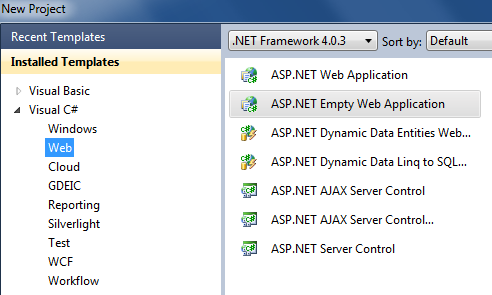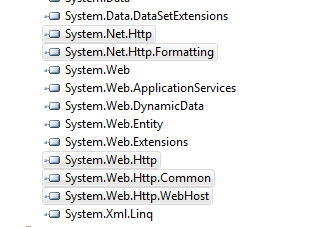ASP.NET Web API 简介
ASP.NET MVC 4 包含了 ASP.NET Web API, 这是一个创建可以连接包括浏览器、移动设备等多种客户端的 Http 服务的新框架, ASP.NET Web API 也是构建 RESTful 服务的理想平台。
ASP.NET Web API 特性
ASP.NET Web API 包含下列特性:
- 先进的 HTTP 编程模型: 使用新的强类型的 HTTP 对象模型直接操作 HTTP 请求和响应, 在 HTTP客户端使用相同的编程模型和 HTTP 管道;
- 支持路由: Web API 完整支持 ASP.NET 路由, 包括路由参数和约束。 此外, 到动作的映射支持约定, 从此将不再需要向类或者方法添加类似于 [HttpPost] 之类的属性;
- 内容协商: 客户端与服务端可以一起决定 API 返回数据的格式。 默认支持 XML, JSON 以及 Form URL-Encoded 格式, 可以扩展添加自定义格式, 甚至可以替换掉默认的内容协商策略;
- 模型绑定与验证: 模型绑定器可以轻易地从 HTTP 请求中提取数据并转换成在动作方法中使用的 .Net 对象;
- 过滤: Web API 支持过滤, 包括总所周知的 [Authorize] 过滤标记, 可以为 Action 添加并插入自定义过滤, 实现认证、异常处理等;
- 查询聚合: 只要简单的返回 Iqueryable<T> , Web API 将会支持通过 OData 地址约定进行查询;
- 改进的 Http 细节可测试性: Web API 不是将 HTTP 细节设置到一个静态的 Context 对象上, 而是使用 HttpRequestMessage 和 HttpResponseMessage 实例, 可以使用这些对象的泛型版本为这些 Http 类型添加自定义类型;
- 改进的依赖反转 (IoC) 支持: Web API 使用 MVC Dependency Resolver 实现的服务定位器模式在不同的场景下来获取实例;
- 基于代码的配置: Web API 单独使用代码完成配置, 从而保证了配置文件的整洁;
- 自托管 (Self-Host) : Web API 除了可以托管在 IIS 中, 还可以托管在进程中,依旧可以使用路由以及其它的特性。
第一个 Web API 程序
从零开始创建 Web API 项目
1、 创建一个空的 ASP.NET 4.0 网站项目
2、 添加对 System.Net.Http , System.Net.Http.Formatting , System.Web.Http , System.Web.Http.Common , System.Web.Http.WebHost 的引用
3、 添加 Global Application Class , 并在 Global 类中的 Application_Start 方法中添加如下代码:
|
1
2
3
4
5
6
7
|
RouteTable.Routes.MapHttpRoute(
name:
"DefaultApi"
,
routeTemplate:
"api/{controller}/{id}"
,
defaults:
new
{
id = RouteParameter.Optional
}
);
|
4、添加一个 ProductsController , 继承自 ApiController , 代码如下:
|
1
2
3
4
5
6
7
|
public
class
ProductController : ApiController {
public
IQueryable<product> GetAllProducts() { ... }
public
Product GetProductById(
int
id) { ... }
}</product>
|
5、 在浏览器输入 URI 访问资源, 也可以通过脚本等任何客户端进行访问, 以浏览器为例:
在地址栏输入 http://localhost:64334/api/products 将会访问到 GetAllProducts 方法, 返回所有的 Product 实例;
在地址栏输入 http://localhost:64334/api/products /1 将会访问到 GetProductById 方法, 返回指定 id 的 Product 实例;
理解 API 路由
对于每一个 Http 消息, ASP.NET Web API 框架通过路由表决定由哪个控制器处理请求。 当你创建一个新的 Web API 项目时, 将会包含一个类似这样的一个默认的路由:
/api/{controller}/{id}
{controller} 和 {id} 是两个占位符, 当遇到一个符合这种样式的 URI , 将将会开始寻找合适的控制器方法进行调用, 规则如下:
- {controller} 用来与控制器名称像匹配;
- HTTP 请求的方法用来与方法名称匹配; (本规则只适用于 GET, POST, PUT 和 DELETE)
- {id} , 如果有, 将会用于和方法的 id 参数进行匹配;
这里有一些请求的例子, 以及基于当前实现情况的的 HTTP 动作结果:
| HTTP Method | URI | Action |
| GET | /api/products | GetAllProducts |
| GET | /api/products/5 | GetProduct(5) |
| POST | /api/products | HTTP Status 405 |
| GET | /api/users/ | HTTP Status 404 |
在第一个例子中, 与 "products" 相匹配的是 ProductsController , HTTP 请求的方法是 GET , 所以框架开始在 ProductController 类里面寻找以 “Get” 开头的方法, 此外, URI 中没有提供 id 参数, 所以框架要找一个没有参数的方法, 最后, ProductsController 的 GetAllProducts 方法满足要求。
第二个例子与第一个类似, 不同的是 URI 里面包含了 {id} 参数。 因此, 框架调用 GetProduct 方法, 因为它需要一个名称为 id 参数。 值得注意的是, URI 里面的 id 参数是字符串类型的 “5” , 框架会根据方法的签名自动把它转换成整形。
在第三个例子中, 客户端发起 HTTP Post 请求, 框架寻找名称以 “Post” 开始的方法。 而 ProductController 类没有这样的方法, 所以框架返回的 HTTP 状态码是 405 , 表示不允许调用的方法 (Method Not Allowed) 。
再看第四个例子, 客户端发送一个 GET 请求到 /api/users 。 框架寻找名称为 UserController 的控制器, 这样的类还没有定义, 所以框架返回的 HTTP 状态码是 404 , 表示请求的资源未找到。
Web API CURD
什么是 CURD
CURD 是指 Create 、 Update 、 Read 、 Delete 四个简单的数据库操作, 通常大多数 Web 服务也通过 REST 风格的服务提供这些操作。
接下来将继续完善 ProductsController 以支持下面所有的操作:
| 动作 |
HTTP 方法 |
相对路径 |
| 获取全部 |
GET |
/api/products |
| 指定 id 获取 |
GET |
/api/products/id |
| 添加 |
POST |
/api/products |
| 更新 |
PUT |
/api/products/id |
| 删除 |
DELETE |
/api/products/id |
资源
ProductController 提供了两种 URI 资源:
| 资源 |
地址 |
| 全部产品列表 |
/api/products |
| 单个产品 |
/api/products/id |
HTTP 的四个主要方法 (GET, PUT, POST, DELETE) 按照下列方式映射为 CURD 操作:
- GET 用于获取 URI 资源的进行展示, GET 操作不应对服务端有任何影响;
- PUT 用于更新 URI 上的一个资源, 如果服务端允许, PUT 也可以用于新建一个资源;
- POST 用于新建 资源, 服务端在指定的 URI 上创建一个新的对象, 将新资源的地址作为响应消息的一部分返回;
- DELETE 用于删除指定的 URI 资源。
实现 CURD
新建资源
客户端发起 HTTP POST 请求新建资源, 为了能处理 POST 请求, 需要在 ProductController 定义一个以 Post 开头的方法, 这个方法接受一个类型为 Product 的参数。
根据 HTTP/1.1 协议, 需要注意的问题有:
- 响应代码: Web API 默认返回的响应代码是 200 (OK) , 但是根据 HTTP/1.1 协议, POST 请求并创建资源的响应代码应该是 201 (Created);
- 地址: 当服务器创建资源之后, 应该在响应的 Header 里面包含新资源的地址。
新建资源的最终代码如下:
|
1
2
3
4
5
6
7
|
public
HttpResponseMessage<product> PostProduct(Product product) {
this
._dbContext.Save(product);
var
result =
new
HttpResponseMessage<product>(product, HttpStatusCode.Created);
var
location = Url.Route(
null
,
new
{ id = product.ProductID });
result.Headers.Location =
new
Uri(location);
return
result;
}</product></product>
|
更新资源内容
更新是比较简单的, 代码如下:
|
1
2
3
4
5
6
7
8
|
public
HttpResponseMessage PutProduct(
int
id, Product product) {
if
(!
this
._dbContext.Products.Any(p => p.ProductID == id)) {
throw
new
HttpResponseException(HttpStatusCode.NotFound);
}
product.ProductID = id;
this
._dbContext.Update(product);
return
new
HttpResponseMessage(HttpStatusCode.OK);
}
|
该方法需要两个参数, id 从 URI 中获取, product 从客户端请求消息中获取。
删除资源
根据 HTTP 协议, 删除应当是幂等的, 也就是说一个 URI 上接受到多少个删除请求都是相同的, 如果资源已经被删除, 也不能返回错误的响应代码。
如果成功删除了资源, 可以返回 200 (OK) 响应代码, 以及一个实体进行状态说明, 或者返回 204 (No Content)。
如果删除需要等待事务完成, 则应该返回 202 (Accepted) 。
删除资源的实现代码如下:
|
1
2
3
4
5
|
public
HttpResponseMessage DeleteProduct(
int
id) {
var
product =
this
._dbContext.Products.FirstOrDefault(p => p.ProductID == id);
this
._dbContext.Delete(product);
return
new
HttpResponseMessage(HttpStatusCode.NoContent);
}
|

